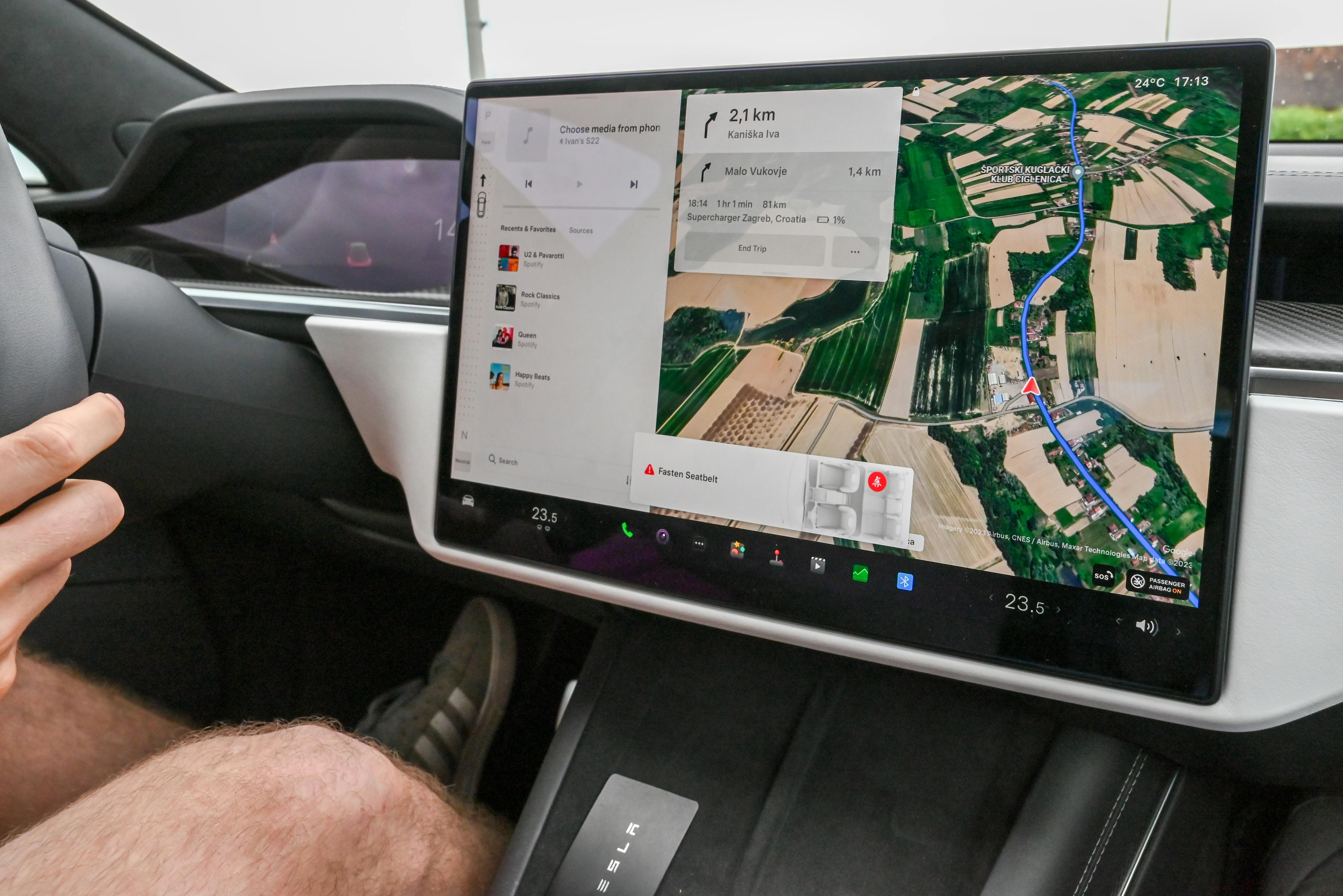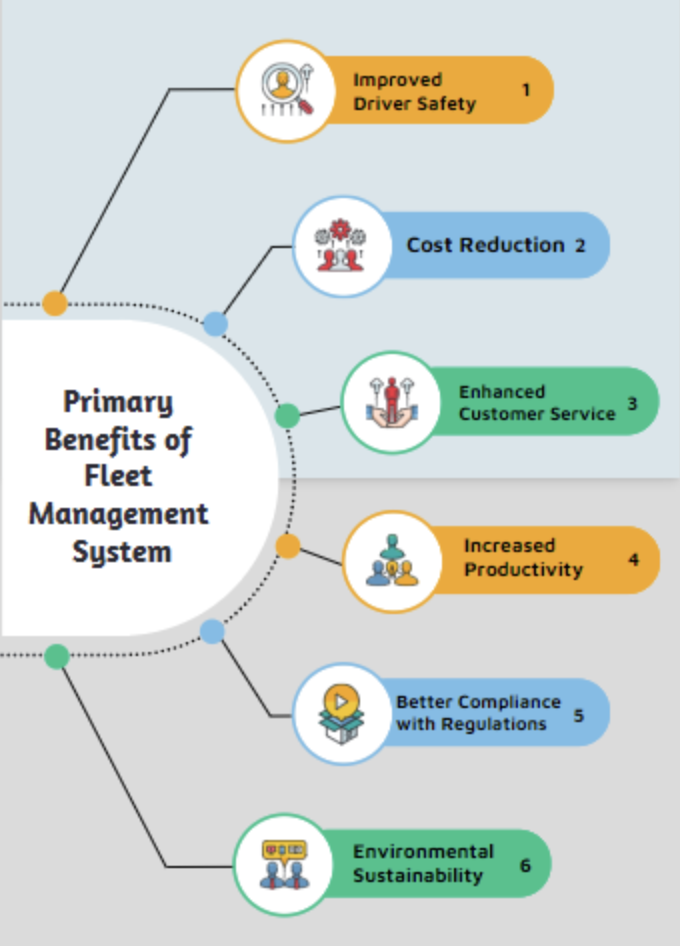Benefits of Fleet Management System
“Fleet management is the art of achieving maximum efficiency and productivity with the least expenditure of time and money." - Thomas H. Davenport

Getting the most out of your fleet vehicles with every mile traveled means top-notch safety, efficiency, and environmental sustainability. The cost of running a fleet is part of your business. That’s why so many rely on fleet management systems (FMS), the innovative tools that can ensure your fleet is managed as efficiently, and easily, as possible.
Whether you’re a seasoned fleet manager, a business owner new to managing logistics, or an active logistics and transportation company, streamlining all processes, enhancing safety and smart resource use is imperative for successful fleet management. Seeing how fleet management improves efficiency, helps businesses keep their wheels turning smoothly, and reduces the overall cost of owning and maintaining a fleet, you’ll want to get a fleet management system for your business.
With fleet management benefits like 30% savings on fuel costs annually and 42% fewer safety incidents, the importance of fleet management systems can't be understated.
Maybe you’ve been interested in fleet management before, but you’re worried that the FMS technology is more of a hassle than it’s actually worth. Read more to learn how fleet management systems and tools are reshaping how logistic vehicles are managed and operated.
What is Fleet Management System

Fleet management systems are a combination of digital tools (software) and connected GPS and telematics devices that help businesses manage their fleet vehicles and optimize routes and all their fleet operations through GPS tracking, telematics, and data analytics.
Using these systems, companies gain a competitive edge because of fleet management benefits. Studies highlight that 55% of businesses are able to cut fuel expenses using telematics, and real-time tracking of service (66%) and speed (61%) boosts their overall efficiency.
Additionally, the importance of fleet management is further emphasized by how these systems help companies comply with regulatory standards and frameworks by managing driver shift times and preventative vehicle maintenance. Regular maintenance prolongs the service life of your vehicles, and helps you avoid costly replacements.
Understanding Fleet Management System
Now let’s dig a little deeper to understand what fleet management systems all are about:
Fleet Management System Definition and Functionality - Beyond the Basics:
A fleet management system isn’t just any singular technology or entity. It’s a host of technologies and tools, all designed to streamline and optimize how businesses manage vehicle fleets for maximum efficiency, safety, and compliance.
Components of Fleet Management System

These systems bring in multiple components to give comprehensive oversight and control over fleet processes, some of the key ones of which are:
1. GPS Tracking
GPS, or Global Positioning System, is the satellite-based navigation system at the heart of fleet management systems. 70% of companies use GPS tracking to manage fleets as it enables them to:
- Monitor real-time vehicle location
- Track trips historically and optimize routes
- Employ geofencing to set virtual boundaries for fleet vehicles and receive alerts or notifications when vehicles enter or exit designated areas and route
2. Telematics
Telematics is another core technology of fleet management systems that combines telecommunications and informatics to deliver, store, and retrieve information. It’s one of the most widely used fleet management technologies with 83% of respondents in a survey reporting its use to manage fleets. Via telecommunication devices, it collects various data points for managing fleets like:
- Fleet vehicle diagnostic data and engine performance
- Fuel consumption and actual mileage
- Driver behavior metrics like speeding, idling, harsh braking, etc.
- Vehicle maintenance records and needs
3. On-board Diagnostics (OBD-II) Devices
On-board diagnostic devices help in vehicle management and maintenance. Businesses connect these devices to fleet vehicles’ OBD-II ports to gather data on engine performance and vehicle health. These devices often pull the vehicle identification number (VIN) automatically, which helps with easy record keeping.
4. Fleet Management Software
Fleet management software centralizes all data sourced by these technologies and tools and enables its easy processing and analysis by providing a user interface to fleet managers so they can monitor and manage fleet operations seamlessly. The best fleet management software allows for easy use without having to learn an overly complicated system.
Historical Development and Evolution of Fleet Management Systems
It is vital to note that fleet management systems haven't always been like they are today, leveraging cutting-edge technology and smart devices. Not too long ago, the systems were different but have evolved over time. Here is how the evolution of fleet management occurred:
Early Tracking Systems (Pre-1990s): Before the 1990s, early fleet tracking systems employed basic radio-based systems to locate vehicles. Motorola’s Radio Common Carrier (RCC) allowed logistic professionals to perform basic vehicle location tracking via radio signals.
Digital Revolution (1990s-2000s): GPS technology gained prominence around 1994, altering the face of fleet management systems by introducing real-time position tracking. Trimble Navigation led this transformation. Additionally, the wide adoption of Electronic Data Interchange (EDI) transformed how shippers and carriers exchanged data.
Telematics Integration (2000s-2010s): Telematics boosted the capabilities of systems by including comprehensive data on vehicle performance and driver behavior.
Advancements in Connectivity (2010s-Present): Cloud computing and mobile technologies further aided in storing data centrally and retrieving it in real-time. Companies like Geotab and Samsara provided cloud-based systems that permitted this.
Features of Fleet Management System

Here are some essential fleet management features present in fleet management systems that can boost your fleet’s efficiency in an unparalleled way. Here’s how:
Real-Time Tracking and GPS
Real-time tracking can allow you to monitor all your fleet vehicles around the clock for efficient dispatching, optimizing routes, and improving your customers’ response time to strengthen overall fleet efficiency.
Geofencing
Geofencing can help you track your vehicles as they enter or exit any designated area by creating virtual boundaries to enhance security, avoid theft and robbery, and ensure your vehicles adhere to designated routes for optimal mileage and fuel consumption. Geofencing is a great feature for knowing your vehicles and employees are at the right job site at the right time.
Driver Behavior Monitoring
This feature can give you a helping hand with driver monitoring regardless of how far your drivers are from your location. You can track and analyze driver performance and keep tabs on safe driving habits and fuel consumption, as well as improve overall fleet safety, efficiency, and cost savings.
Fuel Management
Improving your fuel management can lead to big cost savings for your business. By tracking fuel usage, monitoring efficiency in real-time and hitting sustainability goals you can have more control over a variable cost that’s always changing. Plus, it can help with efficient routing, improved driving behavior and avoid excessive idling.
Maintenance Scheduling and Alerts
This feature allows you to automate vehicle maintenance schedules based on mileage, usage, and/or time, reducing breakdowns and increasing fleet uptime to maintain consistent operational efficiency. You won’t have to rely on memory or paper logs to track maintenance. Preventative maintenance keeps your vehicles on the road for longer and can help you avoid costly repairs and replacement. Regular maintenance greatly reduces your cost of ownership per mile.
Compliance Tracking and Reporting
Using this feature, you can ensure compliance with regulations concerning driver hours and vehicle health and automate compliance tasks to boost efficiency. It really makes compliance easy.
Benefits of Fleet Management System

Adopting a robust fleet management system can afford you various fleet management benefits like:

Improved Driver Safety
48% of fleet managers in the U.S. consider driver safety their top priority. The fleet management system can enhance driver safety through real-time tracking as you can detect unsafe driver behavior and deploy vehicles with confidence knowing they’re in top working condition. Safer driver behavior also means less risk of on-road incidents, and less risk of liability to your business.
Cost Reduction
Fleet management systems significantly impact cost reduction efforts by optimizing routes, lessening fuel consumption, and alerting about maintenance needs so collective operational expenses remain low. Between the fuel savings, smarter routing, and risk mitigation, most fleet management systems more than pay for themselves.
Enhanced Customer Service
Fleet management systems can enhance your customer service and satisfaction by ensuring timely deliveries and safe fleet operations and also keep your customers in the loop with accurate ETAs.
Increased Productivity
Fleet management systems can boost your company’s productivity by enabling efficient scheduling, reducing vehicle downtime with predictive maintenance alerts and services, and aiding workflow management.
Better Compliance with Regulations
Fleet management systems can ensure timely and consistent compliance with all relevant regulations, thereby avoiding penalties and legal problems.
Environmental Sustainability
Fleet management systems support environmental sustainability by endorsing fuel-efficient driving behaviors, cutting down on vehicle emissions by reducing idling, and optimizing vehicle use to reduce carbon footprint.
Success Stories in Fleet Management

There are many success stories in fleet management, which are made possible by these fleet management systems.
Real-World Examples of Successful Implementations
Many companies across different industries have adopted fleet management systems for fleet management improvements. Here are some of their fleet management success stories demonstrated through examples:
FedEx: FedEx employs a sophisticated fleet management system that includes real-time tracking and predictive maintenance. This has led to a 30% reduction in maintenance costs and improved delivery times, enhancing overall customer satisfaction.
UPS: UPS implemented a comprehensive fleet management system to optimize its vast delivery operations. This implementation has significantly enhanced operational efficiency, reduced fuel consumption, and improved customer service by providing accurate delivery ETAs.
Coca-Cola: Coca-Cola implemented a fleet management system that improved route efficiency, resulting in a 15% reduction in fuel costs. The system also enhanced driver safety, leading to a 25% decrease in accidents over two years.
General Motors: GM has adopted fleet management software to streamline operations and improve vehicle tracking. This has contributed to a 20% increase in operational efficiency and reduced downtime through proactive maintenance scheduling.
Statistical Improvements in Safety, Efficiency, and
Cost Savings: Fleet management case studies and research revealed that fleet management systems improved safety, efficiency, and cost savings. Here are some statistics that testify:
Safety Enhancements: 42% of fleets experienced fewer safety incidents after implementing fleet tracking software, highlighting the effectiveness of monitoring driver behavior.
Operational Efficiency: Companies that adopted fleet management solutions reported a 10% increase in operational efficiency, with many achieving positive ROI within 11 months.
Cost Reduction: Organizations utilizing fleet management systems can save over $100 per vehicle annually on maintenance through optimized management practices.
Fuel Savings: 55% of fleets using telematics reported reduced fuel costs, which is significant given that fuel is the largest expense for 32% of fleets.
Emerging Trends in Fleet Management Technology
Fleet management technology is constantly changing, with new trends and software gaining prominence:
Advancements in AI and Machine Learning
The future of fleet management systems will likely be driven by:
Autonomous Vehicles: Autonomous vehicles will enhance efficiency and safety while reducing costs.
AI and Machine Learning: AI in fleet management and machine learning will enable more sophisticated data analysis and decision-making and assist with predictive maintenance alerts and notifications.
IoT: IoT sensors will provide real-time insights into vehicle performance and environmental conditions.
Blockchain: Blockchain technology could improve data security and transparency in fleet operations.
Enhanced Data Analytics and Predictive Maintenance: Fleet management trends concerning data analytics are evolving with a focus on leveraging big data for optimizing routes, fuel efficiency, and maintenance schedules. Predictive maintenance is becoming more sophisticated, using real-time and historical data to predict and prevent equipment and vehicle failures.
Expansion into New Industries and Global Markets: Fleet management systems aren't just limited to logistics. They are diversifying beyond logistics into industries like construction, utilities, and public safety. This expansion is driven by global demand for efficient transportation solutions and regulatory compliance requirements. The examples and use cases we discussed above show fleet management systems have broad applications across industries serving multifarious purposes.
Conclusion

Now that we have explored the ins and outs of fleet management systems, it’s clear why so many businesses rely on them. Fleet management systems are pretty much standard for any business with more than one vehicle or other type of rolling asset. If you look at the fleet management summary and read fleet management benefits in detail or even just take a quick glance, you’ll see how necessary these systems are for the way they enhance operational efficiency, safety, and cost-effectiveness across various industries.
Whether you want to optimize routes to enhance fuel efficiency or aim to ensure top-notch regulatory compliance and driver safety, these can be your go-to systems that will also streamline operations and boost the overall productivity of your business.
By leveraging advanced technologies like real-time tracking, predictive analytics, and automated reporting, your business won't just benefit from reduced operational costs but also improved service delivery and customer satisfaction. Embracing fleet management systems isn’t all about keeping up with technological trends. It’s more about transforming your fleet operations into agile, data-driven processes that drive sustainable growth.
So, whether you are a newbie overseeing a small fleet or a seasoned fleet manager managing a multinational company’s fleet, wait no longer. Take the step today to integrate fleet management systems and keep all your fleet related worries at bay. And there’s no better option than Brickhouse Fleet Tracker for you.
Unlock Brickhouse fleet management systems’ full potential for business improvement and turn your efforts into financial gains in real time!
FAQs about Fleet Management Systems
Still curious and having more fleet management questions? Below are some fleet management FAQs that you can benefit from to satisfy your curiosity:
How long does it take to install a Fleet Management System?
The installation time for a Fleet Management System can vary depending on several factors, including the size of the fleet, the complexity of the system, and the provider's installation process.
Generally, for plug-and-play fleet management installation, the process can be completed relatively quickly, often within minutes per vehicle. However, for hardwired installations that require routing wiring and a more intricate setup, the process may take several hours per vehicle.
How compatible are Fleet Management Systems with our existing IT infrastructure?"
Fleet management system providers typically offer integration options with various existing systems such as ERP, CRM, and telematics platforms. They provide APIs and connectors to facilitate seamless data exchange and ensure compatibility.
It's essential to discuss your specific integration needs with the provider during the planning stages to optimize system performance and data synchronization.
What are the typical costs associated with installing a Fleet Management System?
The fleet management costs can vary based on factors such as the size of your fleet, the features you require, and the provider you choose. Typically, costs include hardware expenses (like GPS devices), software licensing fees, installation charges, and ongoing subscription costs for data and support services.
What technical support is provided during the installation process?
Most FMS providers offer comprehensive technical support to assist with installation. This includes guidance on hardware setup, software configuration, and integration with existing systems. Providers may offer on-site assistance or remote support via phone, email, or live chat to ensure a smooth installation experience.
Posted by Adrienne Evangelista on May 2nd 2025

